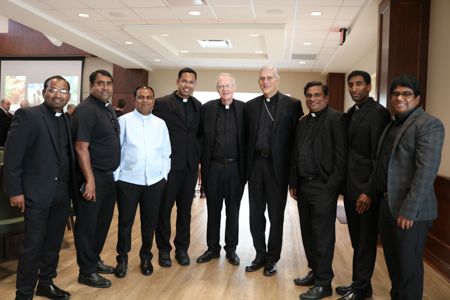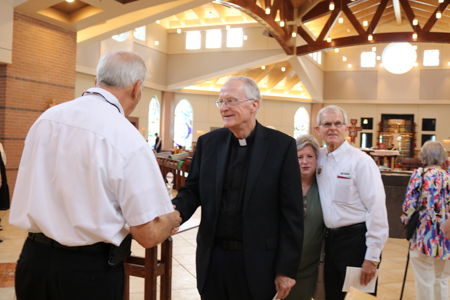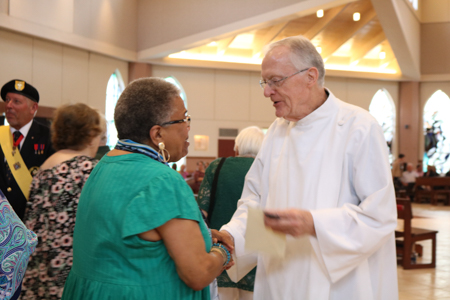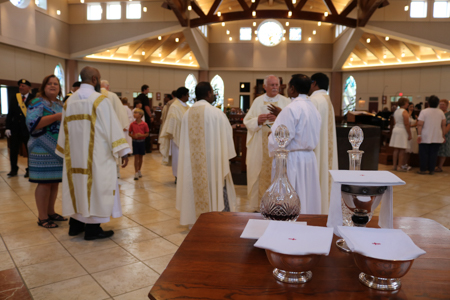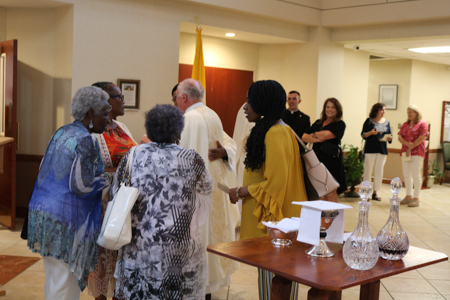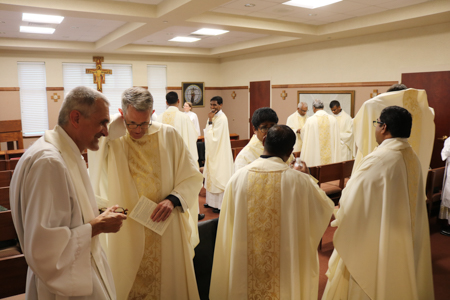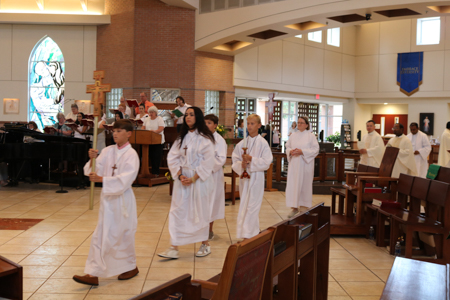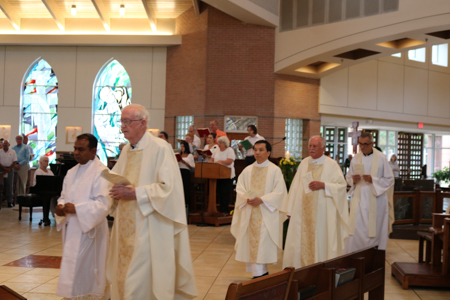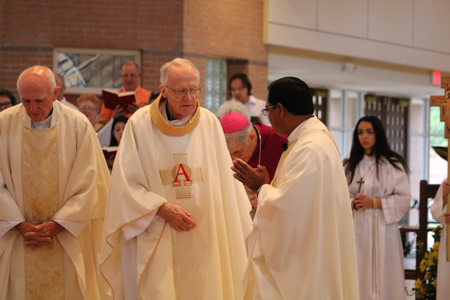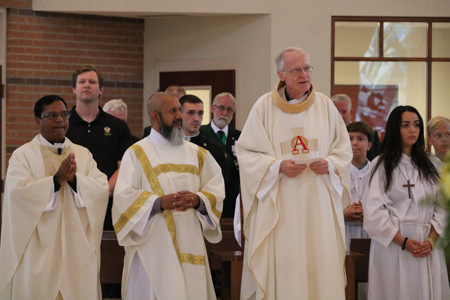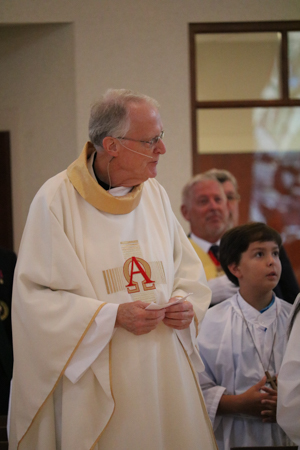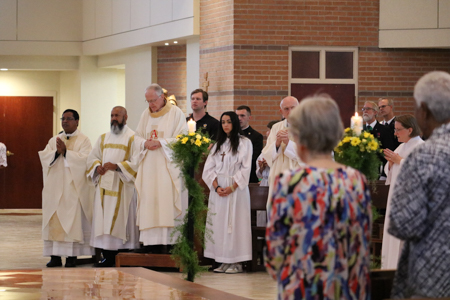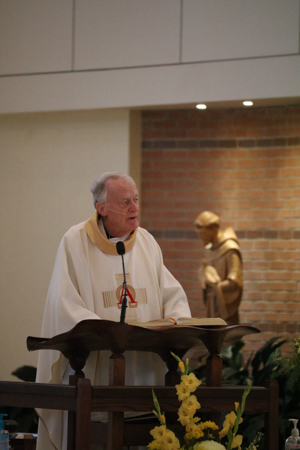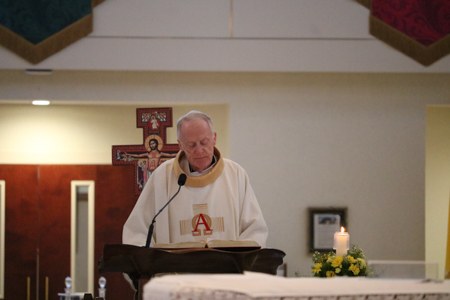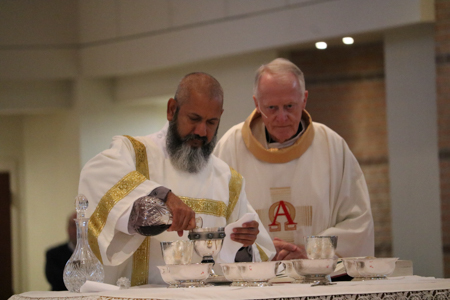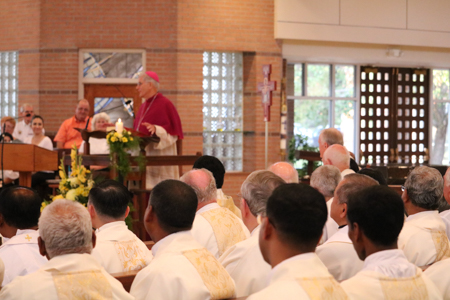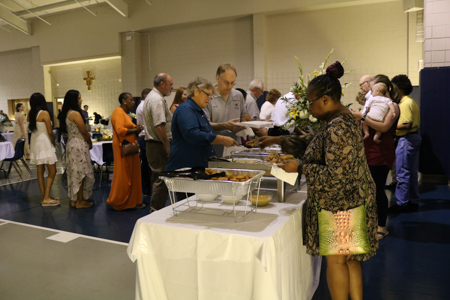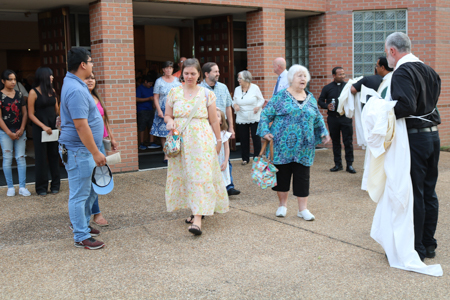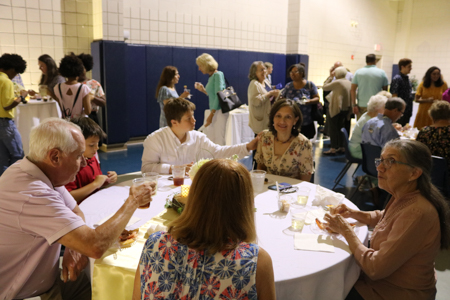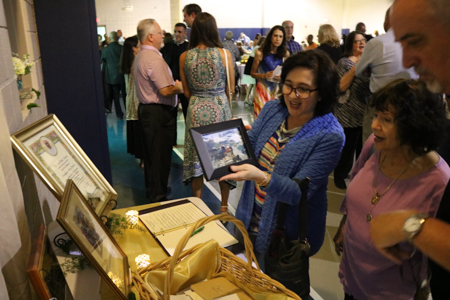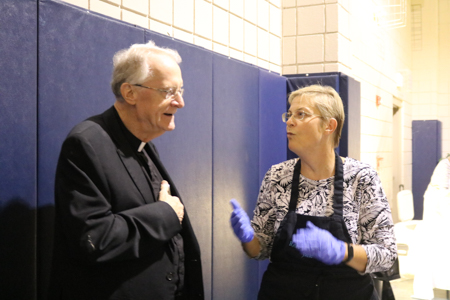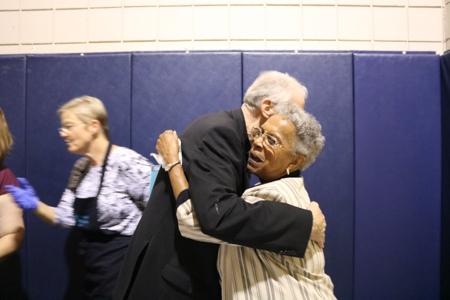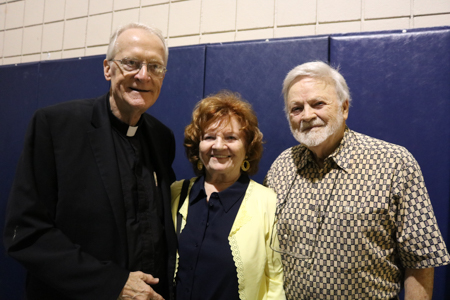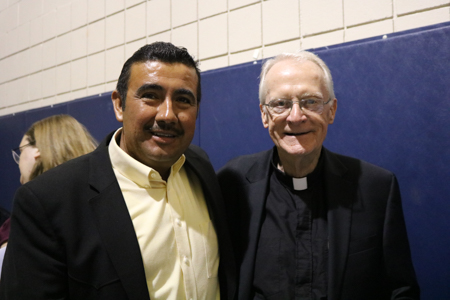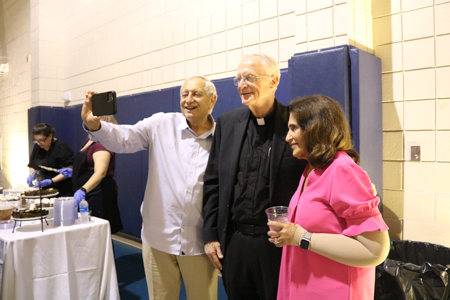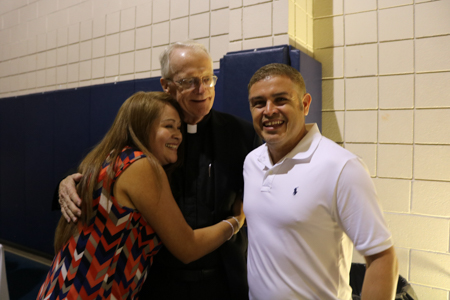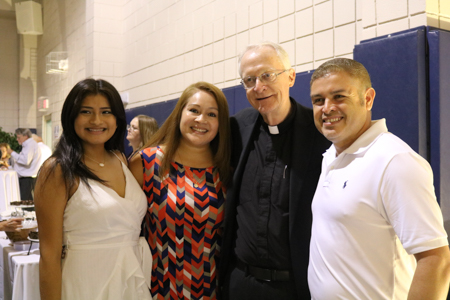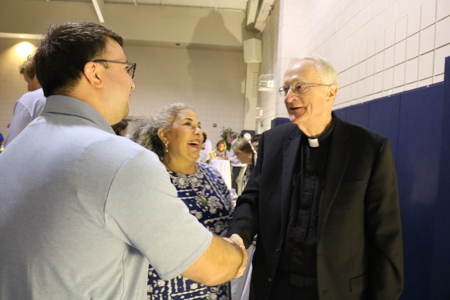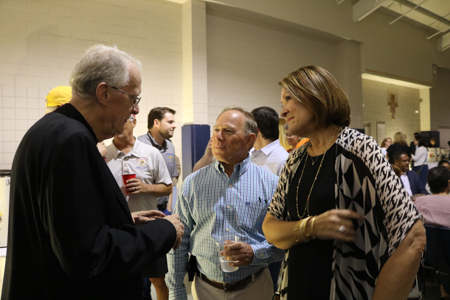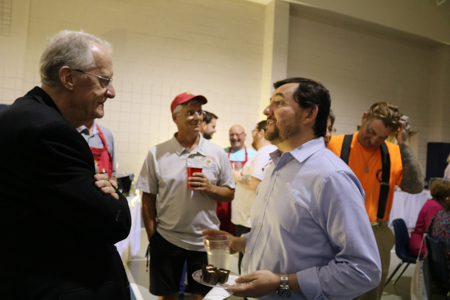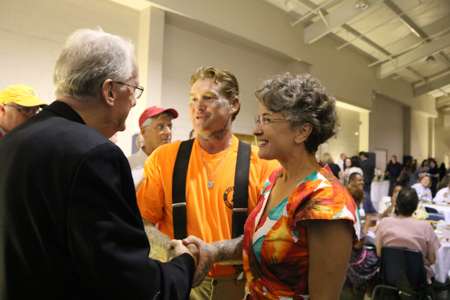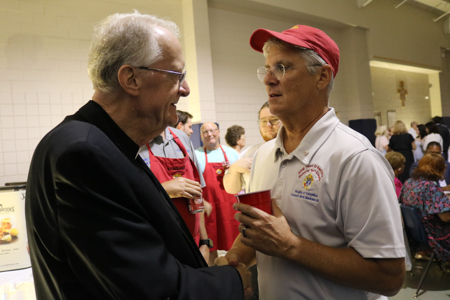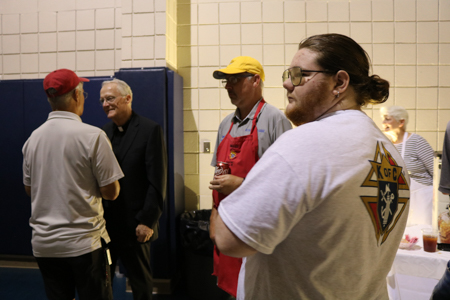By Joe Lee
MADISON – On the evening of Aug. 7, the family life center at St. Francis of Assisi Church in Madison resembled a fine restaurant, with white tablecloths and soft candlelight creating the perfect backdrop for a huge crowd to congratulate Msgr. Elvin Sunds on the golden anniversary of his ordination as a priest.
It was a fitting tribute to the kind, soft-spoken man who grew up in Iowa and has spent more than fifty years of his life bringing Mississippians of different backgrounds together. The throng waiting to enjoy the mouth-watering dinner was no surprise after the standing room only gathering at Mass, which made Sunds feel, in his words, deeply affirmed.
“When I first saw the church packed for the Mass, I was genuinely overwhelmed,” he said. “I had no idea so many people over the years from so many parishes – and from Catholic Charities – wanted to express their gratitude.”
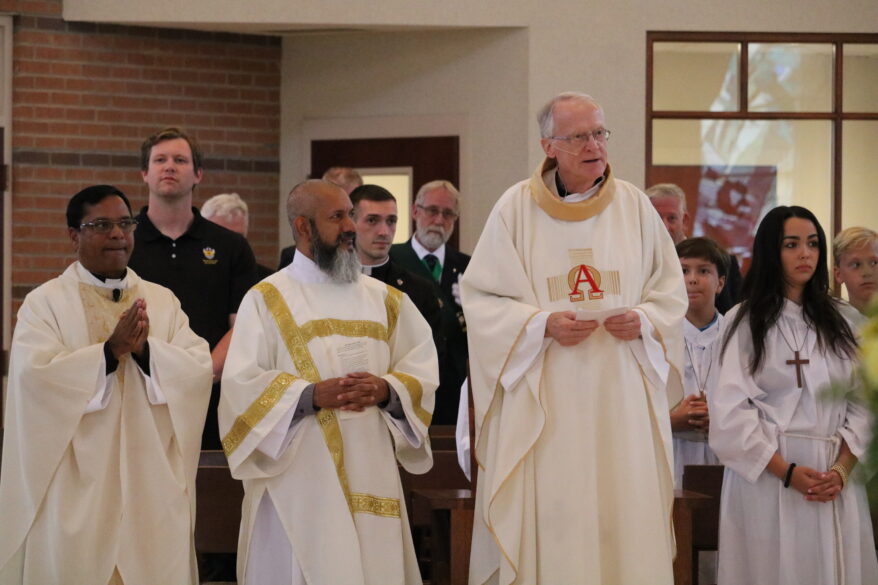
Sunds felt the call toward the priesthood while a senior in high school, but he wanted something more exciting than the Diocese of Des Moines, especially after being told by his vocation director that he was expected to teach high school for the first ten years after ordination.
“During my junior year at Immaculate Conception Seminary in Conception, Missouri, my spiritual director suggested I spend a summer working for a friend of his in New York City named Father John Powis. This was 1967, and Father Powis was working in the rough Bedford-Stuyvesant area of Brooklyn, a largely Puerto Rican and African American neighborhood.
“I was impressed at what Father Powis was doing and found an apartment in a condemned building for the summer. I worked mornings at a commercial laundry to support myself and spent afternoons organizing recreational programs for the neighborhood kids.”
Sunds had seminarian classmates from Mississippi who urged him to visit the state, which he did for the first time that fall.
“Cardinal Bernard Law was the vocation director then for what was the Diocese of Natchez-Jackson,” Sunds said. “He arranged for me to spend several months with Father Nathaniel Machesky, who was pastor of St. Francis of Assisi in Greenwood.
“This was predominantly an African American parish. They were offering education for the kids in the grade school there, a wonderful alternative to what wasn’t a good education in the Greenwood public schools. I realized the Natchez-Jackson Diocese was where I needed to be.”
Since his ordination by Bishop Joseph Brunini at Our Lady of the Gulf in Bay St. Louis on Aug. 5, 1973, Sunds has pastored in Biloxi, Jackson, Meridian, Greenville and Corinth. Revered for his work with Catholic Charities (where he served as executive director from 1978-1994), he was honored by the Mississippi NAACP in 1982 with the organization’s Outstanding Service Award.
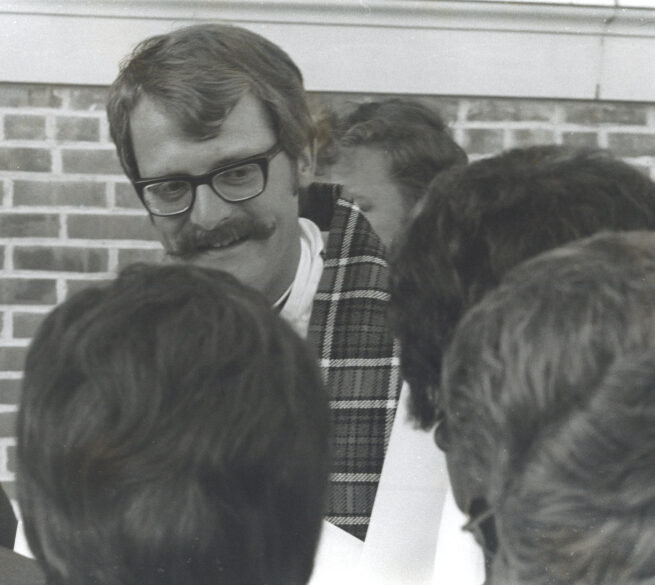
“We established programs while I was there to serve people that had not been served in Mississippi,” Sunds said. “I really encouraged the employees to think toward trying to change the system and make a bigger impact than just the person we were serving. My first hire was Linda Raff as associate director. We made a great team.”
“Msgr. Sunds brought a sense of social justice for all of God’s children, especially those poor and vulnerable,” said Raff, who succeeded Sunds as executive director in 1994 and served in that role 14 years before returning for a final year as director in 2014. “I appreciated that he administered the agency in a very fair-minded way, and it will always be one of my greatest privileges to have worked for him.”
“We’re only 2.5 percent Catholic in the Jackson diocese,” Sunds said. “But we have a tremendous impact, and we have an even bigger impact when we work together ecumenically. The Mississippi Religious Leadership Conference was Baptist, Catholic, Methodist, Jewish – lots of denominations – that worked together in the civil rights era.
“When we work together as people of faith, we can make a tremendous impact in Mississippi, such as the changing of the state flag. The football community, the academic community and the business community were behind it, but it was also the Catholic bishop, Methodist bishop, Episcopal bishop and others that agreed we needed to change it.”
“Msgr. Sunds and I have been friends for almost 30 years,” said retired pastor Raymon Leake. “He invited me to speak in his church (St. Patrick in Meridian at the time), and I invited him to speak in mine (First Baptist of Meridian).
“We’ve worked together on projects as significant as establishing a children’s home, and as seemingly insignificant as sharing with a community that Christians of different backgrounds can work together for the benefit of those who need us.”
“Msgr. Sunds was my predecessor at St. Patrick and did the hard work in setting up a relationship between (predominantly white) St. Patrick and (predominantly black) St. Joseph,” said retired priest Father Frank Cosgrove. “What he did should serve as a model for other places.”
“The attendance at 8:30 Sunday Mass at St. Joseph is now about fifty percent white – they come for the music and hospitality, both of which are wonderful – and Msgr. Sunds deserves great credit for that. A St. Patrick parishioner told me that Msgr. Sunds brought the Meridian Catholic community into the twenty-first century.”
In residence at St. Francis in Madison since officially retiring in 2019, Sunds has taken time off to travel the country, most notably an 8,000-mile excursion that took him to eight national parks and three national monuments. He and Leake, both avid outdoorsmen, have hiked together through the Tetons, the Sierras, the Rockies, and from France into Switzerland through the Alps. He even pastored for a month in 2021 in Nome, Alaska. [Click here to ready the story on his trip to Nome]
Sunds has the admiration of St. Francis pastor Father Albeenreddy Vatti, who praised his brother priest’s work ethic, organizational skills and the simple lifestyle he leads. He has also earned the trust and respect of the parish’s youth.
“When you’re a young priest, you’re kind of a mentor to young people because you’re not far removed from them in age,” Sunds said. “When you get to be middle age, you’re more like a parent, and the relationship changes a bit. Then you get to a stage where you’re more like a grandparent. Maybe they relate to you in a way they wouldn’t relate to their parents.
“You reach out by being accepting and non-critical. And listening.”
